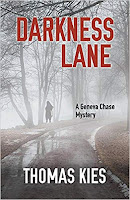Sorry to have been away. It was end of semester and I lost track of my day to blog while reading student papers and getting my grades in.
Douglas's Monday post caught my eye. I've thought a bit about The Sopranos and the bad guy question. As I may have mentioned here, I've been working on a book about the factual aspects of gangster films. The publisher asked me to do nine films and include The Sopranos as my tenth entry because of the TV series influence on popular culture.
I hadn't seen all of the episodes of The Sopranos because I didn't have a subscription to HBO when it was on. I only caught an occasional episode when I was staying at a hotel during a conference. Even so, the show was popular enough that I was able to watch clips and read the commentary by critics and fans. With the book in progress, I decided to watch all six seasons. A daunting undertaking (86 episodes), but fascinating.
Tony Soprano and his crew presented me with a dilemma. It was the same moral dissonance that I experienced with the protagonists in the other gangster movies that I watched or re-watched. As Douglas noted about Tony and Christopher in The Sopranos, the display of humanity by characters who do really bad things can be disorienting.
Michael Corleone in The Godfather does not intend to become a mobster. He has served in World War II and returned home planning to have a life outside the "family business". But when his father, Don Corleone, becomes the target of a rival crime family, Michael kills two men as they are dining in a restaurant. Sent off to Sicily, he marries and suffers the loss of his innocent young bride when one of his men plants a car bomb. Back home in America, his brother Sonny is ambushed and killed. Michael comes home, seeks out Kay, the woman who told he would never become a mobster, and persuades her to marry him. When Don Corleone dies of a heart attack while playing with his grandson in the garden, Michael steps into a role that his other brother is unable to assume. Michael becomes the head of his crime family.
Although many fans rate The Godfather, Part II as a even better movie than the first, I have to say that I find Michael Corleone unredeemable. He has settled too comfortably into his reign as don. He enjoys power too much. He is a dark character, ruthless, cruel. He is not a tragic hero, and I don't care about his fate. Oddly enough, Tony Soprano does worst things, literally has blood on his hands. But the life he leads give him panic attacks. He needs to see a psychiatrist to cope with his anxiety. I care about whether Tony will live or die, and still feel frustrated by the way the series ended. Was Tony dead or alive when the screen went to black?
Ray Liotta's portrayal of real-life mob soldier, Henry Hill, in Goodfellas is another riveting depiction of an incredibly violent man. But Liotta's voiceover narration is engaging. Liotta's Hill is unrepentant and jaunty. He normalizes the violence that he and the other mobsters engage in. He draws us into the subculture, makes us complicit as we root for him because he seems less vicious than other members of his crime family.
Thinking about these two gangsters and the others in the films and the television series I've watched has been useful as I plotted my 1939 historical thriller. I have a character who is a bad guy. He cheats, he lies, he kills. But the deeper I go into his motivation, the more I understand his "why." The more I try to step into his shoes, the better I am able to understand why he is who he is. This makes my feelings about him more ambivalent. I want to be on the side of my protagonist, but I find my bad guy more complex. I need to restore balance between the two.
At any rate, Douglas's post has given me more to think about as I work on my bad guy's back story. I'll ponder the matter after I've enjoyed my Christmas dinner with friends. Speaking of food, that reminds me of the Liotta's detailed description of the meal he was preparing in between the errands he had to do to prepare his female drug courier for a flight she was scheduled to make. . . .
Happy Holidays, everyone! I'll check in with you again in the new year. Wishing us all less stress and more joy.
